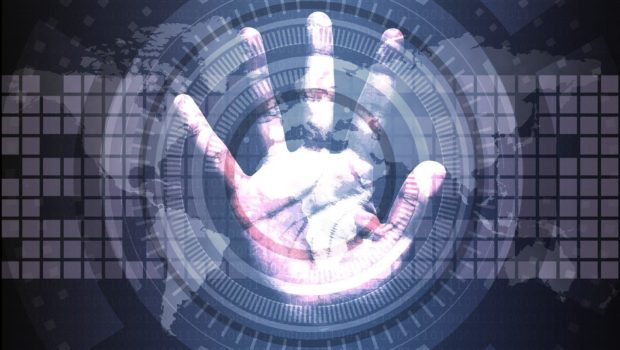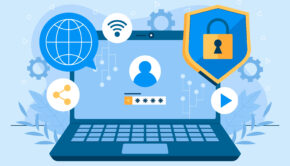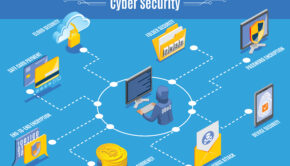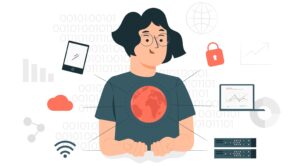CYBERSECURITY 101: PROTECT YOUR PRIVACY FROM HACKERS
Computers have revolutionized many industries with their capacitive storage capabilities. Several international corporations use computer systems to store and process raw data. If we talk about social media platforms, their databases store personal information regarding their users. The banking industry keeps the financial records of numerous individuals. Companies have to secure this information from hackers and protect it from cyber-attacks. For that, we use the technological practice of cybersecurity.
Types of cybersecurity
Experts divide the field of cybersecurity into five areas/layers. You need to understand these different terms for a strong establishment of your security policy. Cybersecurity doesn’t merely deal with digital information, but it also involves protecting the hardware.
- Critical infrastructure security: You can protect the infrastructure, which is vital for the nation’s economy. It includes hospitals, seaports, and fire stations.
- Application security: To prevent unauthorized access to computers, people use firewalls and antivirus programs. You can also use encryption methods to make your data less vulnerable.
- Network security: Three types of network security exist: physical, technical, and administrative. Techniques such as VPN control internal networks and prevent invalid access to them.
- Cloud security: Security and accessibility are more critical than the control and location of your data. Cloud security lessens the risk of a data breach and reduces the cost of storage.
- IoT security: The global Internet of Things market will reach half a trillion dollars by 2021. But security challenges and vulnerabilities hamper the progress of this technology.
Big data analytics
In the world of big data, major companies deal with massive amounts of information frequently. By this year, every single person on earth will generate 1.7 megabytes of data daily. Many students prefer to achieve a data analytics degree online for an excellent career. The science of data analytics allows us to study raw data and produce useful information from it. Earning more than $60,000 annually, data analysts have become one of the most sought-after professionals today.
There are some skills and capabilities a data analytics practitioner must possess, such as:
- Expert know-how of required programming languages such as R and Python
- Mathematical skills and expertise in inferential statistics
- Data wrangling and visualization that allows you to present the raw data in a layman’s terms
For a proper understanding of data analysis, let’s delve further into its main classes:
- The descriptive analysis deals with finding the result of past events.
- The diagnostic analysis deals with the reasons why that outcome emerged.
- The predictive analysis predicts the probability of that outcome occurring again.
- The prescriptive analysis prescribes what actions can affect those events to produce a different output.
Threats to cybersecurity
Have you heard stories about the dark web? Urban legends state that merely a visit to the dark web can grant hackers access to a computer. It is untrue because hackers can only infiltrate your private information if you’re careless enough to give it to them. Most data breaches are results of human error or negligence. There are many threats to cybersecurity you can easily avoid with caution and vigilance. But it’s proper to learn about what kind of “virus” is harmful to your data.
- Malware: It’s short for “malicious software.” This software penetrates the user’s computer, posing as a legitimate application, and damages its files. A trojan is an example of malware.
- Ransomware: This malware blocks the user’s access to his/her files/device and blackmails the user for money. Crypto and locker viruses are two kinds of ransomware.
- Adware: It hides in your computer to monitor your online behavior. It also serves you relatable advertisements. It displays banner ads and pop-ups on your screen without your consent.
- Spyware: It hides in your computer, gets access to your private information, and transmits it to another location. People can lose their passwords and banking details due to this virus.
- Phishing: This practice tricks you into giving away your email/password. Cyber-criminals use emails or phone calls to fool people into revealing sensitive information about them.
Tips to protect your privacy from hackers
A 2017 Pew Research showed that around 70% of adults didn’t know what a VPN did. But more than 80% of them were able to identify the most secure password from a given list. These results show that most Americans possessed basic knowledge regarding cybersecurity. Here are some further tips:
- Most Americans know that public wi-fi isn’t a good option when all you need is cybersecurity. It doesn’t encrypt its traffic, and you can fall prey to any hacker using the same network.
- Your email address and phone number are sensitive and private details about you. There’s no need to share them excessively.
- Using incognito mode can stop your browser from tracking your search history. This tracking serves the same purpose as adware.
- Even some mobile apps can make you a target for unwanted ads. Review these apps’ permissions and don’t let them needlessly access your storage, contacts, camera, or location.
- Change your privacy settings on your social media accounts. Make your private information publicly invisible for security reasons.
- Don’t store your private data on public storage services. For example, Dropbox and Google Docs aren’t ideal places to keep your passwords.
- Use a strong password and secure it further with questions and your mobile number.
Conclusion
Being the primary target of global hackers, the United States spends billions of dollars on cybersecurity. By 2023, Americans will have to account for half of the data breaches worldwide. More than 40% of hackers attacked small businesses. To a locally-owned company, a data breach can cost some $4 million. It takes many months to detect even a significant data breach sometimes. These statistics reveal how badly your company needs to develop a computer security plan. A little knowledge of cybersecurity can save your company loss in time and wealth. With the help of data analytics, professionals can hypothesize new methods to avoid cyber-attacks and hacking.
















